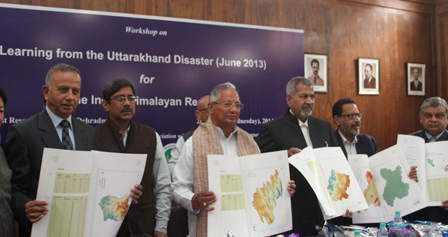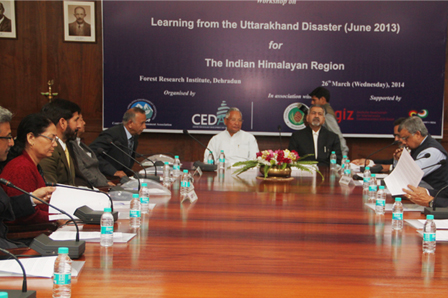Roundtable on Learning from the Uttarakhand Disaster (June 2013) for the Indian Himalayan Region
A roundtable to discuss and draw learning from the Uttarakhand Disaster June/ 2013 was organized in Forest Research Institute, Dehradun on 26th March by Central Himalayan Environment Association (CHEA) and Centre for Ecology and Development (CEDAR) in collaboration with the Regional Economic Development Programme of GIZ. Mr. Govind Singh Kunjwal, Speaker of Uttarakhand Legislative Assembly and Chief Guest of the roundtable said the human has blessed with the power to learn from its experiences and use the learning for its future planning and actions. This is applied for the disaster management and mitigation. It is a relevant step to draw and document learning from June, 2013 Uttarakhand disaster with an objective to share the findings among 12 mountain states of the Indian Himalayan Region (IHR), added Mr. Kunjwal.
Mr. Kunjwal called for organizing a high level meeting of Speakers of the State Legislative Assemblies and if possible of the Chief Ministers of the all 12 mountain states of the IHR for sharing the learning of the Uttarakhand June, 2014 disaster as well as to seek areas of mutual cooperation. He expressed concern over the growing tendency of emerging influence of monetary power among politicians and administrative officials, especially in the resent times, which has made an adverse impact on the developmental priorities and required action on extremism events of disaster in the country.
He was speaking as the Chief Guest of the roundtable on Learning from the Uttarakhand Disaster(June, 2013) for the Indian Himalayan Region organized by Central Himalayan Environment Association (CHEA) and Centre for Ecology Development and Research (CEDAR) with support from Regional Economic Development Programme of German International Cooperation (GIZ) in association with Forest Research Institute organized today here at the board room of FRI campus. Mr. Kunjwal was of opinion the human mind had capacities to develop a firm knowledge base, documented nearly 5,000 years before as evident from the ancient literatures such as Vedas. This illustration tells us that how the people of that time have recognized power of wind, water and fire as well as its impact. However, it appears in our times with the short memory we have we doesn't existing knowledge for planning and action until a disaster has occurred, he added.
Dr. P. P. Bhojvaid Director FRI and Guest of Honour talked about the role of research institutions for collaborative efforts for disaster management and knowledge generation as well its dissemination among the stakeholders. Developing synergy among the institutes working in the Himalayan states, especially in Uttarakhand can contribute in building the capacities of rural communicates in the area of disaster, Dr. Bhojvaid suggested.
Prof S. P. Singh, Chair of Excellence at FRI and former Vice Chancellor Garhwal University, presented a brief recap of process to generated learning from the Uttarakhand June, 2013 disaster and need of knowledge sharing among the mountain states of the IHR. He cited an example of landslides, which equally affects the entire Himalayan region spread over 2400 kms from Jammu Kashmir to Arunanchal Pradesh. Prof Singh pointed out the need of blending of engineering, technology and ecological aspects to ensure the developmental planning is sustainable and called for collective research by the mountain states in this direction. Prof B. K. Joshi, Chair, Doon Library and Research Centre and former Vice Chancellor of Kumaun University raised the governance issues in managing the disasters. He spelt out immediate action points such as attention and implementation of the guidelines of National Disaster Management Agency with state specific requirements, strengthening the information system by involving Indian Metrological Department and involvement of local administration and communities in the planning for disaster management and mitigation.
Mr. Subroto Roy, Programme Manager, Uttarakhand RED- GIZ gave an account of the background of the efforts made and said in today's world it is vital to share knowledge an information. This becomes more critical when it is the case of fragile mountain region of the IHR, covering 16% geographic area of the country he further added. Efforts will be made to share the knowledge products with the state governments and other stakeholders of the IHR, Mr. Roy informed. He stressed the importance of use of technology in the field of disaster management. His thought process was followed by a presentation by Mr. Chaman Lal Dhanda from GIZ on the International Services and the scope of technological support from Germany and other technologically advanced countries.
Introducing the knowledge products developed under the assignment Dr. Subrat Sharma, Scientist of GBP Himalayan Institute of Environment and Development and Council member of CHEA, shared that a book entitled Himalayan Disasters: Uttarakhand, 2013; learning for Planning and Action, Vulnerability Maps of IHR using GIS technique and policy papers on Governance and Disaster Management, Forestry and Natural Resource Management followed by Sustainable Tourism Policy in light of disaster management have been attempted. Mr. Kunjwal, Dr. P. P. Bhojvais and other dignitaries released the publication of edited book having sections on commentary, technical notes and expressions contributed by immanent scientists, policy planners, and researchers along with the Vulnerability map book. Convening the roundtable Dr. Pushkin Phartiyal, Executive Director of CHEA mentioned that the major learning from the Uttarakhand disaster has emerged for valuation of the ecosystem services through involvement of the central government and regional level. Dr Pushkin gave example of the flow of ecosystem services from the mountain region to the Indo- Gengitic plains where more than 500 million populations have been benefited for the last 5,000 years.
During the round table a technical session on need and scope for sharing mechanism among Government departments, Non Governmental organizations, research institutes and knowledge groups of the IHR was conducted. The Panelists Prof. B. K. Joshi, Porf. S. P. Singh and Dr. P.S. Negi of Wadia Institute of Himalayan Geology took the house on the course of vibrant discussions. Participants made valuable suggestions including that the emerging need in the present highly technological world is to evolve a holistic and integrated approach which can reach to people in real time and reduce the response time. It was realized that risk resilience of society has been a key area of concern but development of an Early Warning System never attain the real concern. It was shared during the panel discussion that extreme events are not easy to understand and handle too, but their magnitude of devastation can be certainly minimized by respecting the law of nature and with adequate preparations. It was suggested to lead and provide a sharing platform for the IHR the Mountain Division in the Ministry of Environment and Forests, Government of India, established as a unit of GBP Himalayan Institute of Environment and Development, could be an ideal mechanism which shall involve other similar efforts being made by various groups and organizations.
Mr. S. T. S Lepcha, APCCF, Forest Department, Former Director, VPKAS Dr. A. K. Shirivastava, Dr. Anand Sharma of State Metrological Department, Col (retd) Arun Mamgai, TATA Relief, Dr. Rajendra Koshyari, Himmotthan, Dr. Indraneel Ghosh, Bharat Patwal of IDS, Dr. VRS Rawat, Dr. M. P. Singh and other scientists from FRI and Dr. Vishal Singh, Dr Vivek Dewadi, Amit Bhakuni and other almost 50 participants actively contributed in the deliberations. Dr. Rajesh Thadani, Executive Director of CEDAR valued the suggestions generated through the roundtable of immense importance re-enforced the need of knowledge sharing as well as networking on disaster management and other development issues among the 12 states of the IHR. Dr. Laxmi Rawat, Scientist, FRI expressed the gratitude of the participants in the vote of thanks.


